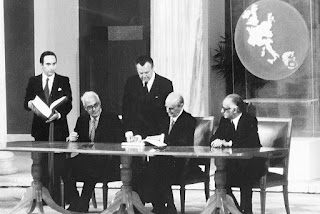Sometimes in the late 1970s, as the European Economic Community decided to rebuff yet another of Greece’s successive bids for accession into the bloc. Since the collapse of the right-wing junta in 1974, Valery Giscard d'Estaing dialed the European Commissions’ economic directorate “We can’t let Plato play the second league” was the French President’s famous answer when given the Commission's offered view that Greece’s economy wasn’t ready to join the forerunner of the EU. In Giscard’s view, philosophy trumped economy.
Greece would finally join in 1981, yet similar paeans to its
ancient history, the birthplace of Democracy, have been sung to ensure that it
stayed as a member, with the notoriously philhellenic French President as one
of the singers. Both Nicolas Sarkozy and
his rival Francois Holland claim in
their memoirs to have taken part in the talks over the debt relief between
Greece and the so-called “troika” throughout the financially rocky 2010s. This decade Emmanuele Macron has turned
France’s Grecian allegiance up a notch. Finally, on last year’s commemoration
of the bicentennial of Greece’s independence in 1821. Why does Greece loom large over the European
and by extension Western mind?
More puzzling, why do professional historians and exalted
philhellenes alike trace the modern Greek nation directly to the ancient
city-states of the ancient period When evidence of direct lineage is so secure.

No comments:
Post a Comment